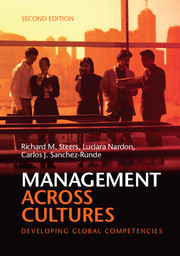Book contents
- Frontmatter
- Contents
- List of exhibits
- Guided Tour
- Introduction
- Part I Challenges for Global Managers
- Part II Developing Global Understanding
- Part III Developing Global Management Skills
- 6 Communicating across cultures
- 7 Negotiating global agreements
- 8 Leading global organizations
- 9 Managing a global workforce
- 10 Working with global teams
- 11 Living and working globally
- 12 Epilogue: the journey continues
- Appendix Models of national cultures
- Name and company index
- Subject index
- References
11 - Living and working globally
from Part III - Developing Global Management Skills
- Frontmatter
- Contents
- List of exhibits
- Guided Tour
- Introduction
- Part I Challenges for Global Managers
- Part II Developing Global Understanding
- Part III Developing Global Management Skills
- 6 Communicating across cultures
- 7 Negotiating global agreements
- 8 Leading global organizations
- 9 Managing a global workforce
- 10 Working with global teams
- 11 Living and working globally
- 12 Epilogue: the journey continues
- Appendix Models of national cultures
- Name and company index
- Subject index
- References
Summary
Management challenge
Living and working globally is both exciting and routine. It is both easy and difficult. Why? Because some people initially bring more skills to global assignments than others – that is, some have less to learn – and because some foreign locations are more comfortable or familiar than others. For example, a manager from Singapore would likely have an easier time moving to the United States or United Kingdom than Ecuador or Peru, because more Singaporeans speak English than Spanish. This does not suggest that they should avoid South America; they just have to work harder, as the territory is less familiar. Moving overseas brings with it a number of challenges, including both psychological and socio-cultural adjustments. In addition, there are personal, time, family, and career considerations. There is also the problem of returning home following the assignment. All of this is doable, of course, but it is made much easier to the extent that managers can develop and enhance their multicultural competence.
Chapter outline
Global assignments page 366
Challenges of living and working globally 373
Adapting to local cultures 379
Managing repatriation 394
Manager’s notebook: Living and working globally 396
Summary points 401
Applications
11.1 Global assignments at Shell 370
11.2 Wei Hopeman, Citi Ventures 374
11.3 Preparing for global assignments 378
11.4 Dining out in Luogang 380
11.5 Mr. Smith and Mr. Zhang 392
11.6 Andrea Walker, returning home 395
There are no foreign lands. It is the traveller only who is foreign.
Robert Louis Stevenson Poet and novelist, ScotlandEveryone thinks in terms of changing the world, but no one thinks in terms of changing himself.
Leo Tolstoy Poet and novelist, Russia- Type
- Chapter
- Information
- Management across CulturesDeveloping Global Competencies, pp. 363 - 404Publisher: Cambridge University PressPrint publication year: 2013



